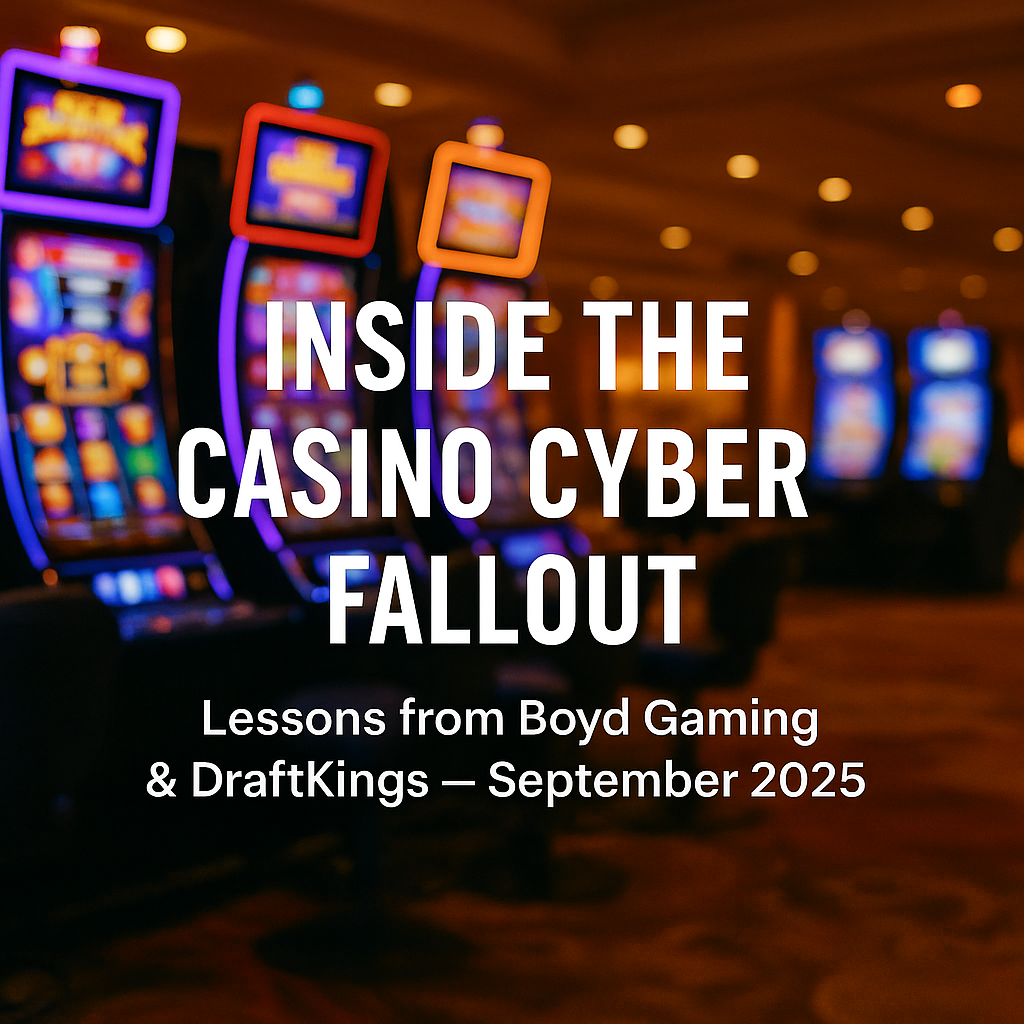In August, we examined how Boyd Gaming’s data breach exposed internal vulnerabilities and highlighted the need for stronger incident response plans across the casino industry.
Just weeks later, the story escalated. Multiple lawsuits have followed, regulators are taking note, and DraftKings issued a warning after detecting unauthorized access attempts on user accounts. Together, these developments mark a turning point for U.S. casino and gaming operators — showing that cybersecurity risk now spans both corporate systems and customer touchpoints.
What Happened: Boyd & DraftKings Incidents
The Boyd Gaming Breach
- Boyd Gaming, one of the country’s largest casino operators, disclosed a cyberattack affecting its internal IT systems and employee data.
- In its 8-K SEC filing, Boyd confirmed that while operations continued uninterrupted, certain internal data had been accessed and removed by unauthorized actors.
- Within weeks, the company faced multiple class-action lawsuits, including claims of negligence in data protection and delayed notification.
- Although customer gaming systems were not impacted, the breach underscores how internal networks and HR systems — often overlooked — can become gateways for attackers. (The Record | Yogonet)
DraftKings Account Access Warning
- Around the same time, DraftKings alerted users that several accounts had experienced unauthorized access attempts using stolen credentials — a likely case of credential stuffing or reused passwords.
- The company stressed that no internal breach had occurred, and sensitive financial systems were secure, but partial user data (emails, phone numbers, dates of birth) may have been exposed.
- DraftKings encouraged all users to enable multi-factor authentication (MFA) and avoid password reuse across platforms.
Together, these events reveal two major pressure points for casino operators: internal system security and account-level credential protection.
Why This Matters for Casino Operators
1. Internal Systems Are Still the Weakest Link
The Boyd breach reminds us that cyber defenses can’t stop at gaming floors or online platforms. Attackers increasingly target back-office systems — HR databases, finance servers, and vendor integrations — to steal data or pivot deeper into networks.
Casinos must adopt a Zero Trust approach, treating every system and user — internal or external — as potentially compromised until verified.
2. Credential Attacks Are Escalating
DraftKings’ warning signals that credential-stuffing and brute-force attacks are resurging. These attacks exploit users’ habit of reusing passwords across multiple sites.
Operators must monitor authentication patterns, enforce MFA, and use behavioral analytics to detect abnormal logins before they become breaches.
3. Legal & Regulatory Exposure Is Mounting
Both incidents highlight an emerging trend: cyber disclosure and liability are now board-level issues. Regulators, investors, and plaintiffs’ attorneys all expect rapid, transparent communication. Failing to meet these expectations can amplify reputational and financial damage.
With the SEC’s new cybersecurity disclosure rules taking effect this year, casino operators — particularly those publicly traded — must ensure that incident response and reporting processes meet federal standards.
4. Player Trust Is on the Line
Casinos are built on trust — not only with players’ money but with their data. A single incident can erode loyalty across physical and online platforms. DraftKings’ swift transparency and public MFA reminders were a good example of proactive crisis handling that others should emulate.
Strategic Response Blueprint: Strengthening Casino Cybersecurity
To mitigate risks in the wake of these September events, casino operators should implement a multi-layered approach that addresses both enterprise and user vulnerabilities.
1. Segment & Harden Internal Networks
- Separate HR, payroll, vendor, and gaming networks.
- Use network segmentation and strict firewall policies.
- Implement role-based access control (RBAC) and frequent permission audits.
2. Enforce MFA Everywhere
- Require MFA for all employee logins and player accounts.
- Use hardware or app-based authenticators, not SMS.
- Regularly test MFA enforcement through red-team simulations.
3. Monitor, Detect, and Respond Continuously
- Integrate real-time monitoring into your Managed Detection & Response (MDR) platform.
- Collect telemetry from both internal systems and external logins.
- Use SIEM tools with correlation rules tuned for credential-stuffing or privilege-escalation patterns.
4. Strengthen Vendor Oversight
- Audit vendors annually for compliance with SOC 2 or ISO 27001 standards.
- Require third-party pen tests and evidence of encryption at rest/in transit.
- Ensure contracts include breach notification clauses within 48 hours.
5. Prepare Disclosure & PR Protocols
- Draft internal communication templates for potential data-exposure scenarios.
- Align legal, compliance, and communications teams for consistent messaging.
- Conduct tabletop exercises simulating both internal data theft and account access events.
The Takeaway: From Breach Response to Continuous Resilience
In our August analysis, we emphasized how casino operators must treat cybersecurity as an operational function, not just an IT issue.
September’s twin wake-up calls — Boyd’s internal breach and DraftKings’ credential attack warning — make it even clearer that risk is a continuum.
As cyber incidents move faster and affect wider ecosystems, casinos that invest early in Zero Trust architecture, 24/7 monitoring, and incident transparency will emerge stronger, not scarred.
👉 Contact Saturn Partners to evaluate your current cybersecurity posture, stress-test your vendor and account defenses, and build a proactive protection strategy for your casino operations.

